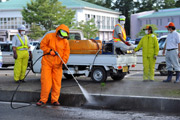You are here
Bill Compiled to Decontaminate Radiation from Fukushima Nuclear Accident
Primary tabs
Bill Compiled to Decontaminate Radiation from Fukushima Nuclear Accident
Fri, 2011-08-19 22:45 — Kathy Gilbeauxsubmitted by Samuel Bendett
asahi.com - August 17, 2011
The central government will decontaminate soil, vegetation and buildings exposed to radiation spread by the accident at the Fukushima No. 1 nuclear power plant.

The contents of a special measures bill to deal with environmental pollution from radioactive materials have been agreed to by the ruling Democratic Party of Japan as well as the opposition Liberal Democratic Party and New Komeito. The parties plan to submit the bill to the Diet next week so that it gains passage before the Diet session winds up Aug. 31.
Under the proposed legislation, the central government will also remove contaminated rubble.
As of now, there are no laws to deal with contamination of the environment by radioactive materials.
As such, it will become the first law to deal with this problem as the result of a nuclear accident.
The bill's objective is to reduce the health risk posed by radiation contamination.
The environment minister would have the authority to designate special areas that require decontamination measures.
After consulting with the appropriate local governments, the central government will draw up a program to carry out the decontamination work.
Areas where contamination levels are lower than the special areas will be designated for study to determine the level of risk. Decontamination of those areas will be conducted by prefectural or municipal governments, although the central government may carry out the work on behalf of the local governments if the need arises.
The environment minister can also designate areas that require the disposal of rubble and other waste materials, depending on the level of radiation contamination. After a disposal plan is drawn up, the central government will assume responsibility for collecting, transporting, storing and disposing of the contaminated waste.
Prefectural governors and mayors can ask the central government to designate certain communities as candidates for the disposal of contaminated rubble.
The Environment Ministry will determine the standards for designating which communities need help with rubble disposal after the law is passed.
Ministry officials are considering designating communities that are within a 20-kilometer radius no-entry zone from the Fukushima nuclear plant as well as those designated as areas where preparations for planned evacuations should be made.
However, discussions about the standards for designation will likely focus on whether only levels of radiation in the air and distance from the nuclear plant should be considered.
The bill calls on Tokyo Electric Power Co. as operator of the nuclear plant to pay for the costs of decontamination and rubble disposal as part of its responsibility to pay compensation for the nuclear accident.
However, the legislation also has a provision that allows the central government to implement whatever measures are deemed necessary to prevent a delay in payments to local governments.
The only law that now has anything to do with radioactive materials is the reactor regulation law which has provisions for disposing of radioactive waste within a nuclear plant site.
There are no laws with provisions for dealing with contaminated soil or waste matter found outside a nuclear plant.
While the bill will be designed to deal with the fallout from the Fukushima nuclear accident, it will also likely be used as a measure to deal with any similar nuclear accidents in the future.

Recent Comments